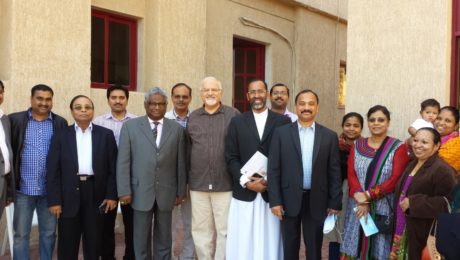The Kuwait Transplant Society (KTS) concluded their awareness campaign ‘Gift of Life’ with a talk on organ donation at the KTS headquarters yesterday. It was presented by Catholic Priest Father Davis Sharma, who is visiting Kuwait. The campaign included activities in schools and churches. The lecture was mostly attended by nurses and doctors from various hospitals in Kuwait.
Donors’ numbers 2014 was a good year for KTS. “Last year we had the largest number of donors. We also established a mobile team of doctors. We depend on Intensive Care Unit (ICU) doctors to refer patients to us. We should have one dedicated doctor in every ICU, but there is a shortage of doctors in Kuwait, so to solve this problem, we came up with an idea. Instead of having a doctor in each hospital, we have a team that visits ICUs daily. We have to diagnose and stabilize the patients, as maintaining brain-dead patients is not an easy job as they are very critical and unstable, and we can lose them. This year we lost many cases as the care was not enough for them,” said Dr Mustafa Al-Musawi, Chairman of KTS.
According to him, doctors provide to living patients, but these are dead people. “So we organized the mobile team whose only job is to look after these patients and sustain them. It needs effort to talk to their families to convince them, and some have to go and discuss the issue with the rest of the family members. So we need to keep them on machines for several days to allow the family to think it over. We don’t force them to make a quick decision.
We tell them to think about it and then take a decision. Many refuse and then agree, and vice versa. They can change their mind at the last minute just before the surgery. We had such a case at Mubarak Hospital when a team of surgeons came from Saudi Arabia, but the family changed its mind at the last minute, so we told the team to go back. The decision should come from the bottom of their hearts,” Musawi said.
121 referrals KTS had 121 referrals last year. “We are covering 7 major hospitals including Adan, Amiri, Jahra, Farwaniya, Mubarak, Sabah and Ibn Sina. A majority of our referrals are mostly old people, so their organs are old and they may have diabetes or hypertension. Also, not all referrals are brain dead – in fact only 60 percent were diagnosed as brain dead, 17 percent were not and 18 percent were unstable. Sometimes the family doesn’t accept a brain death diagnosis. Also, some refuse due to religious reasons,” Musawi explained.
Last year, 110 people benefitted from 24 donors. “These included 42 kidneys and 18 livers that were transplanted in Saudi Arabia, 4 lungs and 9 hearts, also transplanted in Saudi Arabia, 2 pancreases and 35 corneas. We hope that we can soon take corneas from normal deaths, and we hope we will soon be able to perform liver, lung and heart transplants in Kuwait,” stressed Musawi.
The donated organs are transplanted serially, no matter the nationality. “The organs don’t only go to Kuwaitis – all patients who live in Kuwait are entitled to receive organs and we follow the waiting list. Those who carry organ donor cards or their family members who hold it have an advantage in the list,” he concluded.
Saving lives Fr Sharma has himself donated a kidney. He is visiting various countries with the same mission – to convince people to donate their organs and save the lives of others. “There are people waiting for organ transplants. When we give something, only then we get satisfaction. The person who gives is the one who gets satisfaction. I’m satisfied as I gave my kidney and I saved the life of somebody. We have to share, and it’s our responsibility as human beings to share our organs after use. There is no charity if a person donates his organs after death. The charity is if he shares his organs while alive. This is a noble action. Those who receive the organs receive life,” he said.
“You as nurses have more responsibility, as you have the opportunity to speak to patients and their relatives. The noble thing as a nurse is to save a life of a dying person. I’m living happiness as somebody else is living with my kidney and I don’t need any other happiness. Even after my death, my family will proudly say that I donated my organs. When you share your body, that’s the greatest sharing in all religions,” stated Sharma.
A large number of patients in Kuwait are in need for organs. “These patients ask God to make people donate their organs. After death, we won’t take anything with us, but we can take happiness in the heart. If you speak about organ donation every day for 10 minutes, when at work or when traveling, it will help,” he pointed out.
![IMG-20140202-WA00031-300×200-273×182[1]](https://kuwaittransplant.org/wp-content/uploads/2017/06/IMG-20140202-WA00031-300x200-273x1821.jpg)
![sl-273×200[1]](https://kuwaittransplant.org/wp-content/uploads/2017/06/sl-273x2001.jpg)
![متبرع[1]](https://kuwaittransplant.org/wp-content/uploads/2017/06/متبرع1-460x260.jpg)

![local24[1]](https://kuwaittransplant.org/wp-content/uploads/2017/06/local241-460x260.jpg)
![٢٠١٥٠٥٠١_١٢١٢٥١[1]](https://kuwaittransplant.org/wp-content/uploads/2017/06/٢٠١٥٠٥٠١_١٢١٢٥١1-460x260.jpg)